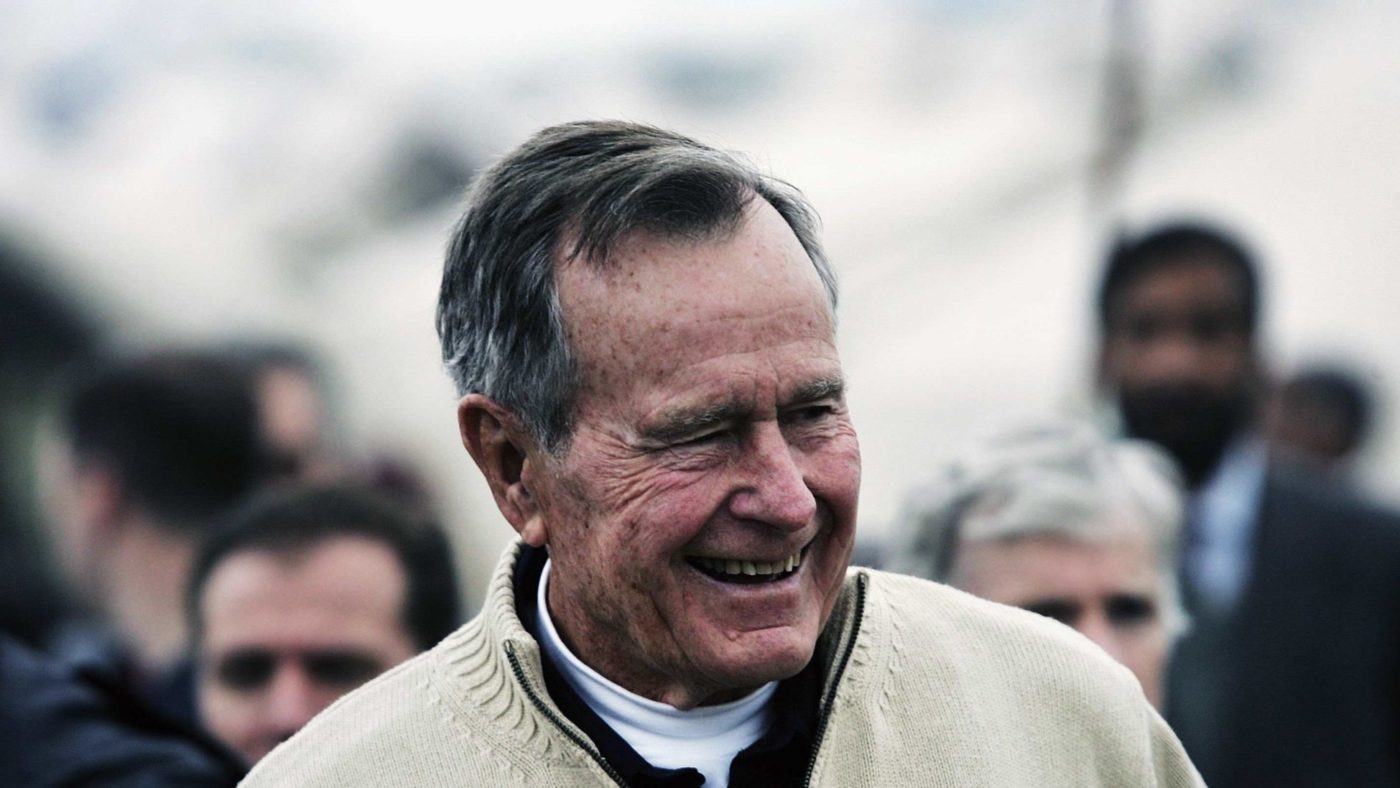As America remembers George H W Bush, expect to hear adoration for the 41st president from as many Democrats as Republicans. Because while it’s true that H W Bush was a true gentleman and proven patriot, he also represented a different time in American politics: a time of politeness.
Many would wish to see that civility restored. Certainly the divergence between the H W Bush brand of presidential leadership and President Trump could hardly be greater. Bush was a man of humility and lifelong public service who saw the president’s role as one above partisanship. President Trump, however, is a man of unrestrained confidence who revels in employing a scorched earth policy against anyone who crosses his path.
Where Bush spoke of the need for “a kinder and gentler nation”, Trump decries his critics as a mix of fools and “enemies of the people”. Where Bush saw foreign policy as the imperative of order and democratic advancement, Trump has no qualms making friends with despots, as long as doing so serves his notion of national interest. Each man was elected for offering these things.
Still, the Bush-Trump divide is as much personal as it is professional. While Trump has spoken eloquent words in memory of President Bush over the past few days, it hasn’t always been so. During the 2016 presidential campaign, Trump went to great lengths to present himself as the antithesis of the Bushes, whom he presented as an elite political family utterly out of touch with most Americans.
Watching Trump in these moments I was struck by the thought that he wanted not simply to discredit the Bushes, but to usurp their role and character as the family archons of Republican politics. And it must be said that for the time being at least, Trump has succeeded. The Trump brand is king of today’s Republican Party.
At least in Congress, most Republican moderates have either been forced out or are preparing to quit. Those remaining have staked their flags firmly in Trump’s corner. It is only in relation to the Mueller investigation that most Republicans are cautious about offering Trump their unrestrained support.
Today, the last remaining institutional rendering of the old-guard Republicans is the federal courts, to which Trump has nominated conservative jurists of traditional stock. So what does this mean for Bush’s legacy and America’s future?
Well, on history and the underpinning nature of American foreign policy, Bush is secure. Presiding over the end of the Cold War and the rise of the unipolar American-led order, Bush’s place in the history books isn’t under threat. And it must be said that while Trump’s impulse is towards a more chaotic, transactional international order, the current president has remained committed to international institutions such as NATO.
Support for these institutions in the bipartisan policy establishment are too deep even for Trump to dredge out. Indeed, Trump’s three most senior national security officials: Secretary of State Mike Pompeo, Secretary of Defense Jim Mattis, and national security advisor, John Bolton, are all firm supporters of the rules-based international order.
On domestic policy, however, Bush’s legacy seems ancient. Defined domestically by his decision to break a tax pledge and accept higher taxes in return for spending cuts, Bush has long been a marker for insurrectionist conservative anger at the establishment. And while President Trump churned and rode this political wave into the White House, it existed long before him.
My friend and McLaughlin Group colleague, Pat Buchanan built his impressive 1992 Republican presidential primary campaign on the narrative that Bush was too amenable to compromise and too unwilling to stand against vested interests in Washington. Bush won the primaries, but Buchanan’s campaign gave Trump his template (with much added ferocity) for victory in 2016.
Today, we see Trump’s interest in bipartisanship only extends as far as his own conception of the national interest at a given moment.
The Bush-Trump divide is perhaps best encapsulated by the president’s policy on entitlement reform. America’s pension and healthcare systems (Americans over 65 have access to heavily funded NHS-style health care) are on a very clear trajectory for bankruptcy. But where a George H W Bush style president would have prioritised the reform of these programs so as to restrain America’s exploding national debt (George W. Bush and Barack Obama tried and failed), Trump has decided to totally ignore the issues.
The math is clear, but with most Americans unaware of the coming entitlement-driven fiscal calamity, and most Democrats calling for ever more spending, Trump is happy to let the pro-reform Republicans cry out in the political wilderness.
Nevertheless, there is at least one element of George H W Bush’s legacy that remains in place: the American expectation of kindness in the most difficult moments. It is notable here that Trump has been so willing and generous in his praise of H W Bush since news of his predecessor’s death became public.
And in Trump’s kindness to a once ardent opponent, we see that while Trump is very different to Bush, he is not the former president’s antithesis.


